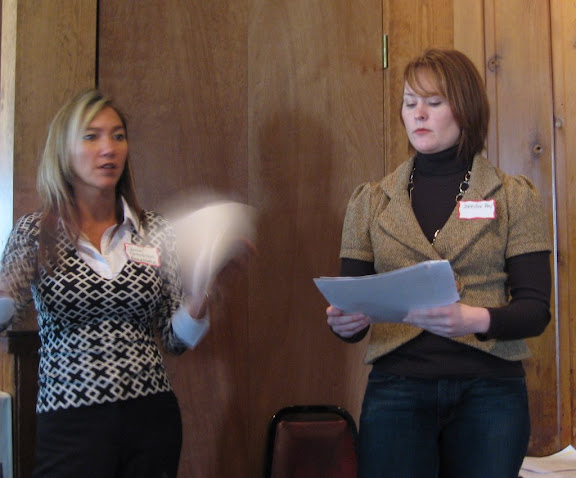 Magazine designers and editors want first rights on the use of high-resolution photographs. Obtaining the photographs for little or no charge ranks as another high priority, especially since business-to-business publications tend to have limited design budgets.
Magazine designers and editors want first rights on the use of high-resolution photographs. Obtaining the photographs for little or no charge ranks as another high priority, especially since business-to-business publications tend to have limited design budgets.More than 30 attendees heard advice on how to come as close to that ideal situation as possible at “Dirt cheap design,” the title of a March 7 meeting of the Kansas City chapter of the American Society of Business Publication Editors held at Hayward’s Pit Bar B Que in Overland Park, Kan.
The two speakers, Jennifer Ray and Danica Tormohlen, deal with their own art budgets. They seek photography and design help inside and outside their respective companies.
Ray, senior art director with Penton Media in Overland Park, designs for American School & University magazine, which has no design budget, and Club Industry’s Fitness Business Pro magazine, which has a budget of $1,500. Besides winning two Maggies, five TOCAs and one national ASBPE award, Ray also has judged the Maggies, ASPBE and Ozzie awards.
Tormohlen works for Ascend Media Publications in Overland Park and serves as editor of EXPO Magazine, which has a design budget of $500 per month. In 2005, Tormohlen and her editorial team won the Folio; Magazine Eddie Award for Editorial Excellence and the min’s B-to-B of the Web for website redesign.
Stock up
Subscriptions to digital art Web sites have become a cost-effective way to find photos, or at least a more inexpensive way then buying compact discs, Ray said. Another option is the web.
“There are tons of different sites out there,” Ray said. “Some of them are better than others.” The art sites are set up differently. Some allow designers to pay a rate fee to download a certain number of photographs per month or per day. Some digital art websites that offer credit programs to purchase specific pieces.
A few sites worth reviewing include:
Source key
Sources are another way to find art. In her assignment letters to freelancers and full-time writers, Tormohlen tells them to ask for head shots of any or all their sources. Ray likes to work with manufacturers and sometimes asks their help in taking cover photographs. For example, John Deere has its own in-house studio and a library of images.
Both speakers said make an attempt to gain first rights to use photographs. Ray said when outside organizations like manufacturers run a photo shoot for a magazine cover, she requests that the magazine be allowed to publish the photo first before the outside organization publishes it.
EXPO Magazine reports on trade shows and conventions, which normally hire their own professional photographer and then allow publications to use the photographs for free, Tormohlen said. Convention and visitors bureaus at cities playing host to events generally have their own free images, too. Many times the images are ready to be downloaded from a website.
Picture savings
When publications can afford professional photographers, they can save money by hiring the apprentice instead of the head photographer, Ray said. Although not as experienced, the apprentice has access to the same studio and the same camera equipment. Contacting colleges also can lead to finding students who will work for a discounted rate, Ray said. Other photographers will offer a discounted rate if an agreement is reached to use them for a certain number of photo shoots per year.
Magazine cover photographs can eat up a good portion of a design budget, but they offer a great way to get a magazine noticed. Ray said she likes to perambulate through the magazine section of a book store and see which publication covers “pop out.”
Tormohlen said every other issue she tries to do a photo shoot for the cover, which can run $1,000. She selects issues where a story will lead to a good photo shoot.
“Some months we spend zero, and some months we spend $1,000,” she said. “It really depends upon the photographer we get in and where they want to have the photo shoot.”
Take it inside
Ray said her company bought a digital camera that several magazines use. Now, in-house photographers can shoot cover photographs for the two magazines she works for, she said. Publishing companies also might save money by paying for continuing education classes at area colleges, which can allow artists to pick up new skills and negate the need to contract out for such work, Ray said.
Both Ray and Tormohlen said issue reviews, which involve critiquing photographs and designs, can lead to better quality. Tormohlen said she likes to invite people outside the editorial department and art department, such as the publisher, sales representatives and circulation personnel, to a free lunch inside a conference room. There, they can spend about an hour critiquing the latest issue’s design and photography.



No comments:
Post a Comment